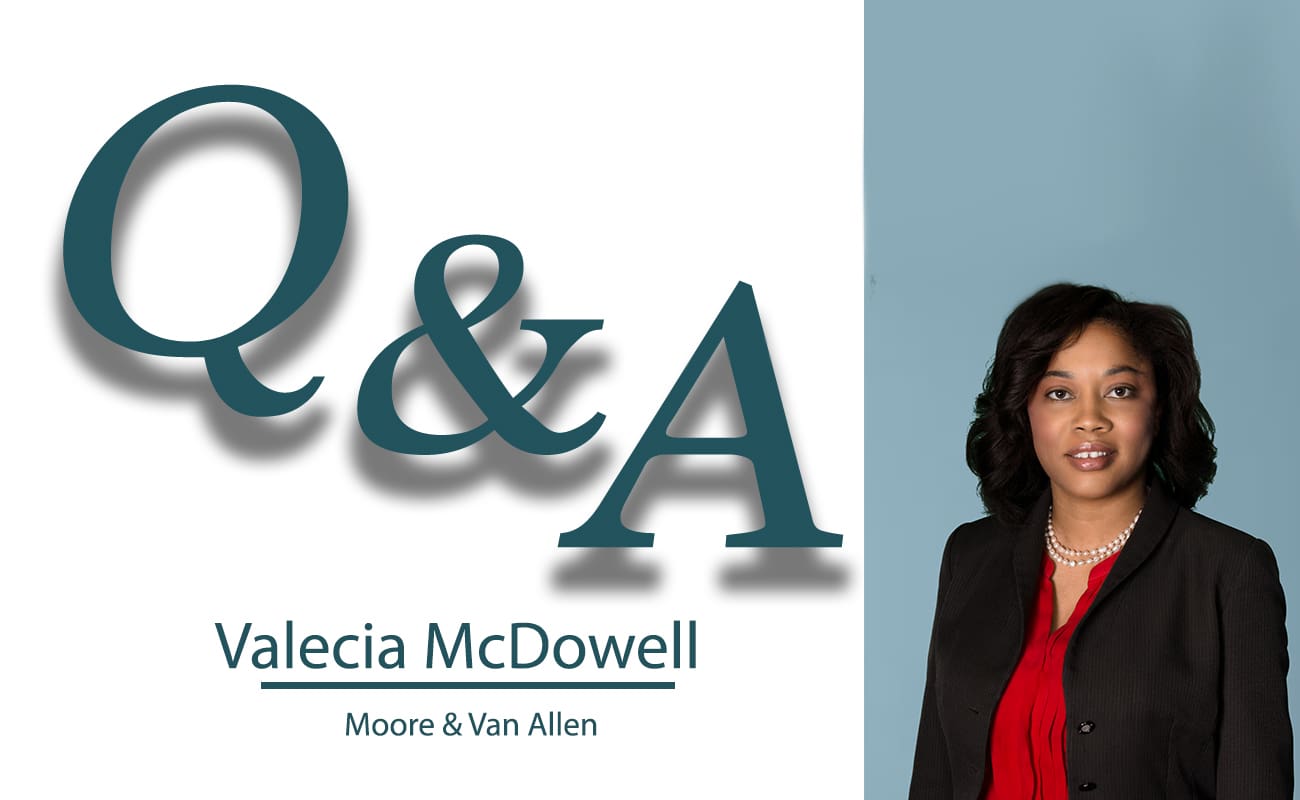Q&A with Moore & Van Allen’s Valecia McDowell
CCI’s Maurice Gilbert chats with Valecia McDowell, Co-Head of the White Collar, Regulatory Defense and Investigations practice at Moore & Van Allen and a recent addition to the firm’s management committee. Valecia discusses her new role, some of the biggest risks facing companies today and what makes a good leader.
About You
Maurice Gilbert: Who or what helped shape your views as a compliance professional?
Valecia McDowell: I was raised in a blue-collar, working-class family. Over the course of my 20-year career, a significant portion of my practice has involved banks and other financial services companies. I’ve found that my family’s financial experiences inform my viewpoints and recommendations when I am engaged to support my clients in the consumer space. I understand the perspective of a single mom who is trying to get credit for the first time, a young couple that is struggling with mortgage or checking fees and a millennial who feels burdened by student loan debt. That understanding aids in the crafting of solutions that are both business-centric and consumer-focused.
MG: What differentiates your approach?
VM: The success of our team at Moore & Van Allen PLLC has been built on our commitment to fostering constructive, respectful relationships between ourselves and our clients on the one hand and regulators and law enforcement representatives on the other hand. To accomplish this, we focus on being direct, candid, responsive and pragmatic. When our work reveals a potential or existing problem, we work diligently and creatively to find a practical solution. Many firms focus primarily on “issue spotting,” and that is certainly an important component of what we do. That being said, however, Moore & Van Allen has differentiated itself in the investigation and financial advisory areas by partnering with our clients to provide cost-effective, end-to-end service. Oftentimes our team at Moore & Van Allen can identify challenges, suggest mitigations and then implement and monitor proposed solutions for the same fee our client might pay a different firm to simply identify the problem.
We have top talent (including the former Global General Counsel of Bank of America, the former General Counsel for the Americas for The Bank of Tokyo-Mitsubishi UFJ, Ltd and a former Deputy Comptroller of the OCC). Being based in Charlotte rather than New York or Washington D.C., we also have a highly competitive cost structure. We have also developed deep expertise in process management. All of this allows us to delve deeper into our clients’ operational drivers and business imperatives and engage from end-to-end in order to validate our work.
On Leadership
MG: What do you think makes a good leader?
VM: I have been fortunate to develop leadership and management skills through a range of endeavors, both professional and charitable. I was recently elected to serve on Moore & Van Allen’s Management Committee, which I consider to be a real honor and a privilege. In addition, I have served as Co-Chair of Moore & Van Allen’s 30-person White Collar, Regulatory Defense & Investigations practice for several years and have successfully conducted many complex investigations for Fortune 500 companies domestically and abroad. Those types of engagements require significant project management expertise to produce efficient results, which I have gained through formal and on-the-job training. Investigation engagements, if done well, also require a great deal of “people” management. Through that work, I have learned the art of bringing together diverse teams, empowering individuals to step up and fostering discourse (and disagreement) for the purpose of surfacing and exploring the very best ideas.
Through all my opportunities as both a leader and a team member, I have concluded that certain traits are essential for good workplace leadership: integrity, intellectual curiosity, professional acumen, empathy, emotional stability, enthusiasm and a willingness to admit when you are wrong. A lot of leaders forget one additional requirement: being present and available for your team. No matter how great you are, if you are not physically or mentally present and approachable to develop, support and encourage your team, you aren’t leading — leading demands connectedness.
MG: How can leaders address risk?
VM: Addressing risk requires several things. First, you must perform a clear-eyed assessment of the facts, which is at the heart of all of our investigative efforts. Everyone brings personal and institutional biases to their circumstances – leaders cannot adequately address risk without acknowledging and accounting for those biases.
Once challenges are identified, risk professionals must ensure that the lessons learned from those challenges are applied across the institutional platform; it is not enough to solve the problem in front of you, leaders must anticipate and mitigate the risk that the same problem presents itself elsewhere in the institution.
Finally, we emphasize to our clients the need to clearly define roles in their compliance, risk and legal divisions of their institutions. This ensures that the voices of subject matter experts in each group are heard and reduces the risk of personality-driven imbalances among the key decision-makers.
Advice for Compliance
MG: How can CCOs effectively partner with legal?
VM: Again, the most effective way to create strong partnerships is through role definition. (Compliance is typically charged with seeking adherence with the defined rules through testing and monitoring and Legal is typically tasked with interpreting the law.) It can often be beneficial to refer to regulatory guidance to accomplish this goal. See OCC Heightened Standards https://www.occ.treas.gov/news-issuances/news-releases/2014/nr-occ-2014-117a.pdf.
Through training on the appropriate roles and personal engagement of the teams involved, effective partnerships can be built and the decision-makers in the respective departments can be fully empowered on behalf of the institution.
MG: Compliance departments are often asked to accomplish their work with limited resources … do you see this situation changing any time soon?
VM: Like it or not, pressure to contain costs is likely here to stay. As a regional firm handling some of the most complex, global investigations facing the financial services industry, we are often tasked with accomplishing “a lot with a little.” We address these issues in a number of ways that can be effective for compliance departments as well. First and foremost, we rely heavily on project management training and techniques to efficiently handle complex matters. Second, we pride ourselves on working well with others, which reduces friction, time and cost. To that end, we regularly partner with other law firms and consulting firms on an as-needed basis for specialized or regional expertise. This enables our clients to leverage our cost-efficient platform and services to the greatest degree possible while also ensuring access to specialized services often limited to more expensive geographic markets. Finally, we have observed clients achieving greater efficiencies through seeking our advice on targeted issues at the front end, avoiding the need to apply internal resources. While this may feel counterintuitive, these investments go a long way for the health of the business.
Advice for the Financial Service Industry
MG: What do you see as the greatest business risks facing companies today?
VM: The threat of a cyberattack is an existential risk for businesses in all industries. Regulators have been calling out this threat for years. While civil plaintiffs face significant standing challenges and there is a relative absence of significant regulatory fines, the costs associated with a data breach extend far beyond direct legal consequences.
MG: How has the regulatory environment changed in this administration and what does that mean for compliance departments?
VM: For one thing, regulators appear to have more flexibility than they had during the Obama Administration. For example, in the latest stress test results, two banks were given the option to receive a “conditional non-objection” if they limited their payout to shareholders. In years past, these institutions likely would have failed. (See https://www.wsj.com/articles/wall-street-gets-the-friendlier-fed-its-been-waiting-for-1530558419.) Despite this flexibility, fines remain significant. Even the CFPB, which has been pulling back under this administration, issued a $1 billion fine — the second highest fine in the agency’s history — under Acting Director Mulvaney. (See https://www.marketwatch.com/story/mulvaneys-first-fine-at-cfpb-is-second-largest-in-history-of-agency-2018-04-20.)
MG: What do you see as the greatest regulatory risks facing companies today?
VM: One cannot overstate the business consequences that flow from lack of predictability in the current global regulatory environment.
This lack of predictability manifests itself in a variety of ways. How will this presidential administration approach issue X on the national or international regulatory stage? How will prohibited activity (such as public corruption or money laundering) be enforced from one country to the next? How will new judicial appointees impact the influence to be wielded by regulatory and administrative bodies in the years to come? Should our company invest significant time and money in retraining efforts or technological developments to comply with new legislation if we think the political pendulum may swing in the opposite direction in a particularly volatile economic or political environment?
This type of uncertainty can be paralyzing for many. In this sort of environment, compliance and legal professionals have to be prepared to not only comply with existing rules and regulations but anticipate and prepare for changes in the regulatory landscape. What was commonplace (or even unregulated) one day may be subject to intense regulatory scrutiny the next. Take for example, LIBOR. Our team represented a major financial institution through the global investigation into LIBOR, a formerly unregulated reference rate. Interestingly, the reverberations from that investigation are still being felt by the industry as regulators in the U.S. and abroad are working toward shifting the markets away from LIBOR and to alternative reference rates. My colleagues Ed O’Keefe and Neil Bloomfield in our bank regulatory practice are regularly communicating with and presenting alongside regulators and industry leaders as we try to figure out the best way to position our clients as the markets transition away from this key reference rate. Again, the key is to anticipate change and prepare for it before it arrives on your doorstep.
 Valecia McDowell is the Co-Head of Moore & Van Allen’s White Collar, Regulatory Defense and Investigations practice. McDowell has experience conducting internal investigations for publicly traded, privately-held and non-profit institutions in the U.S., Europe, Asia and South America. In so doing, McDowell has represented clients in disputes, investigations, and/or negotiations involving the DOJ, SEC, HUD, FINRA, CFTC, USDA, OIG, Congress, State Attorneys General, the U.K. Financial Conduct Authority (FCA), the Japanese Financial Services Agency (JFSA), the Comissão de Valores Mobiliarios (the Brazilian Securities Commission), and the Banco Central do Brasil (the Central Bank of Brazil), among others. McDowell also possesses significant trial, arbitration, regulatory defense experience in complex, high-stakes cases, particularly in the financial services, securities, manufacturing, telecommunications and health care industries.
Valecia McDowell is the Co-Head of Moore & Van Allen’s White Collar, Regulatory Defense and Investigations practice. McDowell has experience conducting internal investigations for publicly traded, privately-held and non-profit institutions in the U.S., Europe, Asia and South America. In so doing, McDowell has represented clients in disputes, investigations, and/or negotiations involving the DOJ, SEC, HUD, FINRA, CFTC, USDA, OIG, Congress, State Attorneys General, the U.K. Financial Conduct Authority (FCA), the Japanese Financial Services Agency (JFSA), the Comissão de Valores Mobiliarios (the Brazilian Securities Commission), and the Banco Central do Brasil (the Central Bank of Brazil), among others. McDowell also possesses significant trial, arbitration, regulatory defense experience in complex, high-stakes cases, particularly in the financial services, securities, manufacturing, telecommunications and health care industries.













